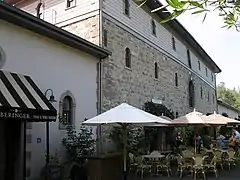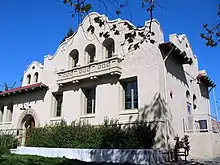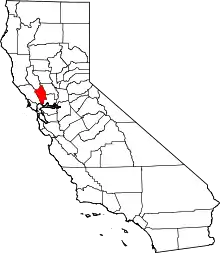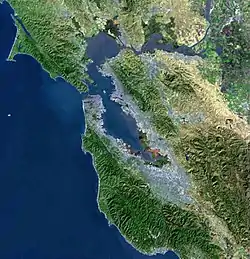St. Helena, California
St. Helena (/həˈliːnə/ hə-LEE-nə) is a city in Napa County, California, United States. Located in the North Bay region of the San Francisco Bay Area, the population was 5,438 at the 2020 census.[8]
St. Helena | |
|---|---|
  .jpg.webp)   Clockwise: The Culinary Institute of America at Greystone; V. Sattui Winery; the Richie Block downtown; former train depot; Beringer Vineyards | |
| Motto(s): "Napa Valley's Main Street",[1] | |
 Location in Napa County and the state of California | |
| Coordinates: 38°30′19″N 122°28′13″W | |
| Country | United States |
| State | California |
| County | Napa |
| Incorporated | March 24, 1876[2] |
| Re-incorporated | May 14, 1889[3] |
| Government | |
| • Type | Council–manager[3] |
| • Mayor | Geoff Ellsworth[4] |
| Area | |
| • City | 5.08 sq mi (13.16 km2) |
| • Land | 4.96 sq mi (12.83 km2) |
| • Water | 0.13 sq mi (0.33 km2) 0.81% |
| Elevation | 253 ft (77 m) |
| Population | |
| • City | 5,438 |
| • Density | 1,231.5/sq mi (475.49/km2) |
| • Metro | 138,019 |
| Time zone | UTC-8 (Pacific) |
| • Summer (DST) | UTC-7 (PDT) |
| ZIP code | 94574 |
| Area code | 707 |
| FIPS code | 06-64140 |
| GNIS feature IDs | 277588, 2411758 |
| Website | www |
St. Helena is a popular tourist destination, owing to its vineyards and culinary scene. The city is the center of St. Helena American Viticultural Area (AVA), which expands 9,060 acres (14 sq mi) of the Napa Valley with over 400 vineyards encompassing 6,800 acres (2,800 ha) of cultivation.[9] St. Helena is the location of The Culinary Institute of America at Greystone and a campus of Napa Valley College.
History


St. Helena was first inhabited by a native American group known as the Wappo people. They spoke Yukian and are believed to have first settled in St. Helena as early as 2000 B.C.[10] The Wappo name for the area is Anakotanoma, meaning 'Bull Snake Village'.[11]
The area was likely named after a nearby mountain known as Mount St. Helena.
The locale became renowned when White Sulphur Springs was discovered in 1848 and established as an operating resort in 1852. During the later 19th century, affluent San Franciscans traveled here by steamer across the Bay, and then four miles by stage and later by train. At its prime, California's oldest resort was able to accommodate 1000 guests in its grand hotels which were later lost to local wildfires.[12] The site is recognized as a National Historic Landmark.[13]
The town of St. Helena was founded by Henry Still, who bought land from the Edward Bale family in 1855. By 1858 there was a school house and a little Baptist church. Four years later Professor William Brewer of the Whitney party called it a "pretty little village with fifty or more houses . . .nestled among grand old oaks."[14] It officially became a town on March 24, 1876, and by 1886 the population grew to 1,800 inhabitants. Shortly after in 1868, the first railroad was created in St. Helena allowing for shipment of resources such as fruit and mining products. The newly built train tracks also brought in tourists.[15]
Ellen White, co-founder of the Seventh-day Adventist Church, had a home called Elmshaven near St. Helena, beginning in 1900. She died there in 1915, and the site is now a National Historic Landmark. Both the Beringer Vineyards and the Charles Krug Winery are California Historical Landmarks.[16]
St. Helena's community center was built as a Carnegie library; it served as the city library from 1908 to 1978.[17]
Geography
St. Helena has a total area of 5.03 sq mi (13.0 km2), of which 4.99 sq mi (12.9 km2) is land and 0.11 sq mi (0.3 km2) (0.81%) is water.
Climate
.jpg.webp)
The National Weather Service has a cooperative weather station in St. Helena. Winters are cool and wet, while summers have hot days and cool nights with little precipitation. Average temperatures in December, the coldest month, range from 58.3 °F (14.6 °C) to 39.6 °F (4.2 °C). Average temperatures in July and August, the warmest months, range from 89 °F (32 °C) to 56 °F (13 °C). There are an average of 54.6 days with highs of 90 °F (32 °C) or higher and an average of 13.8 days with lows of 32 °F (0 °C) or lower. The record high temperature was 115 °F (46 °C) on July 13, 1972, and the record low temperature was 11 °F (−12 °C) on December 11, 1932.
Average annual precipitation is 33.97 inches (863 mm). There are an average of 68 days with measurable precipitation. The wettest year was 1983 with 75.40 inches (1,915 mm) and the driest year was 1976 with 10.41 inches (264 mm). The wettest month on record was February 1986 with 25.60 inches (650 mm). The most rainfall in 24 hours was 6.83 inches (173 mm) on January 21, 1967. Although snow rarely falls in St. Helena, there is an annual average snowfall of 0.2-inch (5.1 mm). The most snowfall in one month was 4.0 inches (100 mm), recorded in January 1974 and again in March 1976. The most snowfall in 24 hours was 4.0 inches (100 mm) on March 2, 1976.[18]
| Climate data for St. Helena, California, 1991–2020 normals, extremes 1907–present | |||||||||||||
|---|---|---|---|---|---|---|---|---|---|---|---|---|---|
| Month | Jan | Feb | Mar | Apr | May | Jun | Jul | Aug | Sep | Oct | Nov | Dec | Year |
| Record high °F (°C) | 83 (28) |
86 (30) |
95 (35) |
98 (37) |
107 (42) |
110 (43) |
115 (46) |
112 (44) |
113 (45) |
104 (40) |
93 (34) |
83 (28) |
115 (46) |
| Mean maximum °F (°C) | 70.9 (21.6) |
75.1 (23.9) |
80.8 (27.1) |
87.6 (30.9) |
93.0 (33.9) |
100.9 (38.3) |
102.4 (39.1) |
102.0 (38.9) |
100.4 (38.0) |
92.6 (33.7) |
79.6 (26.4) |
69.6 (20.9) |
105.0 (40.6) |
| Average high °F (°C) | 58.8 (14.9) |
62.5 (16.9) |
66.8 (19.3) |
71.8 (22.1) |
78.1 (25.6) |
85.4 (29.7) |
88.7 (31.5) |
88.8 (31.6) |
86.6 (30.3) |
78.1 (25.6) |
65.8 (18.8) |
58.3 (14.6) |
74.1 (23.4) |
| Daily mean °F (°C) | 49.5 (9.7) |
52.2 (11.2) |
55.4 (13.0) |
59.0 (15.0) |
64.3 (17.9) |
69.8 (21.0) |
72.4 (22.4) |
72.3 (22.4) |
70.2 (21.2) |
63.7 (17.6) |
54.7 (12.6) |
48.9 (9.4) |
61.0 (16.1) |
| Average low °F (°C) | 40.2 (4.6) |
41.9 (5.5) |
43.9 (6.6) |
46.3 (7.9) |
50.5 (10.3) |
54.2 (12.3) |
56.0 (13.3) |
55.7 (13.2) |
53.8 (12.1) |
49.4 (9.7) |
43.7 (6.5) |
39.6 (4.2) |
47.9 (8.8) |
| Mean minimum °F (°C) | 29.9 (−1.2) |
32.0 (0.0) |
34.8 (1.6) |
37.1 (2.8) |
42.0 (5.6) |
46.3 (7.9) |
49.9 (9.9) |
50.1 (10.1) |
45.8 (7.7) |
39.8 (4.3) |
32.2 (0.1) |
28.2 (−2.1) |
26.3 (−3.2) |
| Record low °F (°C) | 16 (−9) |
18 (−8) |
24 (−4) |
27 (−3) |
31 (−1) |
36 (2) |
37 (3) |
38 (3) |
33 (1) |
22 (−6) |
11 (−12) |
13 (−11) |
11 (−12) |
| Average precipitation inches (mm) | 6.47 (164) |
6.71 (170) |
4.98 (126) |
1.97 (50) |
1.31 (33) |
0.35 (8.9) |
0.01 (0.25) |
0.04 (1.0) |
0.06 (1.5) |
1.65 (42) |
3.24 (82) |
7.18 (182) |
33.97 (863) |
| Average precipitation days (≥ 0.01 in) | 13.3 | 10.6 | 10.4 | 5.5 | 3.4 | 0.8 | 0.2 | 0.1 | 0.5 | 3.3 | 8.1 | 12.9 | 69.1 |
| Source 1: NOAA[19] | |||||||||||||
| Source 2: National Weather Service[20] | |||||||||||||
Demographics
| Census | Pop. | Note | %± |
|---|---|---|---|
| 1880 | 1,339 | — | |
| 1890 | 1,705 | 27.3% | |
| 1900 | 1,582 | −7.2% | |
| 1910 | 1,603 | 1.3% | |
| 1920 | 1,346 | −16.0% | |
| 1930 | 1,582 | 17.5% | |
| 1940 | 1,758 | 11.1% | |
| 1950 | 2,297 | 30.7% | |
| 1960 | 2,722 | 18.5% | |
| 1970 | 3,173 | 16.6% | |
| 1980 | 4,898 | 54.4% | |
| 1990 | 4,990 | 1.9% | |
| 2000 | 5,950 | 19.2% | |
| 2010 | 5,814 | −2.3% | |
| 2020 | 5,438 | −6.5% | |
| U.S. Decennial Census[21] | |||
The 2010 United States Census[22] reported that St. Helena had a population of 5,814. The population density was 1,156.7 inhabitants per square mile (446.6/km2). The racial makeup of St. Helena was 4,525 (77.8%) White, 25 (0.4%) African American, 35 (0.6%) Native American, 98 (1.7%) Asian, 9 (0.2%) Pacific Islander, 978 (16.8%) from other races, and 144 (2.5%) from two or more races. Hispanic or Latino of any race were 1,914 persons (32.9%).
The Census reported that 98.3% of the population lived in households and 1.7% lived in non-institutionalized group quarters.
There were 2,401 households, out of which 694 (28.9%) had children under the age of 18 living in them, 1,118 (46.6%) were opposite-sex married couples living together, 223 (9.3%) had a female householder with no husband present, 99 (4.1%) had a male householder with no wife present. There were 96 (4.0%) unmarried opposite-sex partnerships, and 20 (0.8%) same-sex married couples or partnerships. 805 households (33.5%) were made up of individuals, and 411 (17.1%) had someone living alone who was 65 years of age or older. The average household size was 2.38. There were 1,440 families (60.0% of all households); the average family size was 3.03.
The population was spread out, with 1,280 people (22.0%) under the age of 18, 453 people (7.8%) aged 18 to 24, 1,333 people (22.9%) aged 25 to 44, 1,627 people (28.0%) aged 45 to 64, and 1,121 people (19.3%) who were 65 years of age or older. The median age was 42.9 years. For every 100 females, there were 88.2 males. For every 100 females age 18 and over, there were 84.9 males.
There were 2,776 housing units at an average density of 552.3 per square mile (213.2/km2), of which 55.4% were owner-occupied and 44.6% were occupied by renters. The homeowner vacancy rate was 2.7%; the rental vacancy rate was 5.8%. 51.4% of the population lived in owner-occupied housing units and 46.9% lived in rental housing units.
Economy
Major employers in St. Helena include Trinchero Family Estates, Beringer Vineyards, and The Culinary Institute of America.[23] The city is distinct in its regulation against chain restaurants; only one exists in the city - an A&W - established before the legislation was enacted.[24] The St. Helena AVA was designated in 1995 for the valley region surrounding the town. Duckhorn Vineyards, Newton Vineyard, Charles Krug Winery, Brown Estate and numerous other vineyards and wineries exist near St. Helena. Adventist Health St. Helena is located in neighboring Deer Park.
Government
St. Helena is a general law city which lacks its own charter. It operates under a council–manager form of government.[3] In the California State Legislature, St. Helena is in the 3rd Senate District, represented by Democrat Bill Dodd,[25] and in the 4th Assembly District, represented by Democrat Cecilia Aguiar-Curry.[26] In the United States House of Representatives, St. Helena is in California's 4th congressional district, represented by Democrat Mike Thompson.[27]
Education
.jpg.webp)

Saint Helena Unified School District is the local school district. Saint Helena Primary School teaches kindergarten through second grade.[28] Saint Helena Elementary School teaches grades three through five,[28] and is ranked as the #2 best public school in the Napa Valley.[29] Robert Louis Stevenson Middle School teaches grades six through eight;[28] it is ranked as the #1 best public middle school in the Napa Valley, with a teacher to student ratio of 13:1.[29] St. Helena High School teaches grades nine through twelve;[28] it is ranked as the #1 best public school in the Napa Valley.[29]
The city has two tertiary campuses: the Upper Valley Campus of Napa Valley College, and The Culinary Institute of America at Greystone, a branch campus of the main institution in Hyde Park, New York.
Notable people
- Michela Alioto-Pier, former member of the San Francisco Board of Supervisors
- Wayne Belardi, Major League Baseball player
- David Duncan, vintner
- M. F. K. Fisher, food writer
- William Hamilton, cartoonist and playwright[30]
- Fred Hofmann, MLB player
- Siegfried Horn, archaeologist and Biblical scholar
- William B. Hurlbut, born in St. Helena, raised in NY, professor at Stanford University Medical Center
- Charles Krug, winemaker
- Bob Marshall, mayor of San Bruno, California
- Fritz Maytag, businessman
- Donald C. McRuer, congressman
- Don Mossi, MLB player
- Peter Newton, winemaker[31]
- Charles O'Rear, photographer
- Billy Orr, MLB player
- Carl Osburn, naval officer and sports shooter
- Frank K. Richardson, associate justice of the California Supreme Court
- Dave Smith, engineer and musician
- Edwin R. Thiele, missionary, writer and archaeologist
- Mike Thompson, U.S. Representative for California's 5th congressional district, St. Helena native and lifelong resident
- Josephine Tychson, the first woman to build and operate a winery in California
- Owen Wade, politician
- Ellen G. White, author and co-founder of the Seventh-day Adventist Church.
In popular culture
- One of Disney's classic movies "Pollyanna" was filmed on Railroad Avenune in Saint Helena in 1960.[32]
- The Elvis Presley 1961 release, "Wild in the Country", was filmed in a small Saint Helena house now known as a popular inn called The Ink House.[33]
- "A Walk in the Clouds" (1995) was filmed in northern Saint Helena. The movie depicts a love story involving a daughter of a vineyard owner.[34]
- "Patch Adams" (1989) starring Robin Williams had a scene filmed at the picturesque cemetery in St. Helena.[35][36]
- The "When Death Comes Calling" episode (S6.E2, 2013) of My Ghost Story was filmed at a winery in the city.
See also
References
- "ST. HELENA NAPA VALLEY'S MAIN STREET Trademark". Alter.com. Retrieved January 23, 2015.
- "California Cities by Incorporation Date". California Association of Local Agency Formation Commissions. Archived from the original (Word) on November 3, 2014. Retrieved August 25, 2014.
- "About St. Helena". City of St. Helena. Retrieved January 23, 2015.
- "City Council". City of St. Helena. Retrieved September 11, 2019.
- "2019 U.S. Gazetteer Files". United States Census Bureau. Retrieved July 1, 2020.
- "Saint Helena". Geographic Names Information System. United States Geological Survey, United States Department of the Interior. Retrieved February 25, 2015.
- US Census Bureau, 2020 report Quick Facts, St. Helena city, California https://www.census.gov/quickfacts/sthelenacitycalifornia
- US Census Bureau, 2020 report Quick Facts, St. Helena city, California https://www.census.gov/quickfacts/sthelenacitycalifornia
- "St. Helena AVA" (Napa Valley’s Wine Epicenter). Napa Valley Life Magazine. August 5, 2020.
- "Who were the Wappo?". Napa Valley Register. August 12, 2007. Archived from the original on September 29, 2020.
- "Wappo Language". Wappo Indians of Napa County. Archived from the original on February 8, 2012. Retrieved August 15, 2012.
- "White Sulphur Springs". NoeHill Travels in California: Napa County Points of Interest.
- "White Sulphur Springs". Historical Marker Project. 1993.
- "The St. Helena Viticultural Area (94F–015P)" (27 CFR Part 9 60 FR 47053 [T.D. ATF–366; RE: Notice No. 801] RIN 1512–AA07 Final rule). Federal Register. Alcohol and Tobacco Tax and Trade Bureau, Treasury Department. 60 (175): 47053–47061. September 11, 1995. Archived (PDF) from the original on March 31, 2021.
 This article incorporates text from this source, which is in the public domain.
This article incorporates text from this source, which is in the public domain. - "St. Helena Historical Society". City of St Helena.
- "California Historical Landmarks: Napa County". Office of Historical Preservation, California State Parks. Retrieved September 6, 2014.
- "Carnegie Libraries of California". Pat & Bernie Skehan. Retrieved December 20, 2014.
- Western Regional Climate Center website
- "U.S. Climate Normals Quick Access". National Oceanic and Atmospheric Administration. Retrieved January 7, 2023.
- "NOAA Online Weather Data". National Weather Service. Retrieved January 7, 2023.
- "Census of Population and Housing". Census.gov. Retrieved June 4, 2015.
- "2010 Census Interactive Population Search: CA - St. Helena city". U.S. Census Bureau. Archived from the original on July 15, 2014. Retrieved July 12, 2014.
- "Economic Reports". City of Napa. Archived from the original on August 19, 2018.
- "St. Helena Municipal Code". Code Publishing. City of St. Helena. February 11, 2014. Retrieved September 14, 2014.
- "Senators". State of California. Retrieved August 25, 2014.
- "Members Assembly". State of California. Retrieved August 25, 2014.
- "California's 4th Congressional District - Representatives & District Map". Civic Impulse, LLC. Retrieved January 18, 2023.
- "St. Helena Unified School District". St. Helena Unified School District.
- "Saint Helena Unified School District Rankings". Niche.com.
- Faber, Nancy (August 20, 1979). "Parties with the Upper One Percent Provide the Pith and Vinegar for Bill Hamilton's Cartoons". People. Retrieved February 12, 2015.
- Rubenstein, Steve (February 9, 2008). "Peter Newton dies – Sterling Vineyards founder". San Francisco Chronicle. Retrieved April 4, 2018.
- "Pollyanna". Film In America.
- "Wild in the Valley, When Elvis left Napa". Napa County Historical Society. March 7, 2021.
- "A Walk In The Clouds". The Worldwide Guide To Movie Locations. 1995.
- "Patch Adams" (Filming & Production). IMDb.com. 1989.
- "Patch Adams - I Love You Without Knowing How" (Video). YouTube. 1989.



